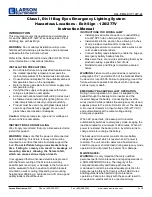
HAL-EMG-EXT-12W-2L
Larson Electronics, LLC
Phone: (800) 369-6671
Fax: (903) 498-3364
www.larsonelectronics.com
1
of
2
Class I, Div II Bug Eyes Emergency Lighting System
Hazardous Locations - Exit Sign - 120/277V
Instruction Manual
INTRODUCTION
This document covers the operation and maintenance
for an HAL-EMG-EXT-12W-2L series Explosion Proof
LED Bug Eye with Exit Sign.
WARNING:
Do not attempt installation until you are
familiar with all warnings, precautions, and procedures
outlined within this instruction sheet.
Refer to the National Electric Code (NEC) NFPA 70 for
more information on hazardous locations.
INSTALLATION PRECAUTIONS
•
Do not install fixture in any classified location where
the marked operating temperature exceeds the
ignition temperature of the hazardous atmospheres.
•
Consult fixture nameplate for the suitability ambient
temperature shown on the nameplate.
•
Refer to fixture nameplate for minimum supply wire
temperature rating.
•
Verify that the supply voltage agrees with fixture
rating as indicated on nameplate.
•
All local and national electrical/building codes must
be followed when installing this lighting fixture. For
code interpretation, consult your local authority.
•
Product must be used only with glass tubes intact
and all cap threads fully engaged. Do not use if
glass tubes are cracked or damaged.
Caution:
Only use lamp size, type and /or wattage as
shown on fixture nameplate.
INSTRUCTIONS FOR INSTALLING
We strongly recommend that only a licensed electrician
install this product.
WARNING:
Make sure that the power is disconnected
before installing. This fixture is heavy and must be
mounted to a surface that can structurally support the
load.
Do not let fixture hang on one bracket at any
time. Failing to comply can result in breakage of
mounting bracket, allowing the fixture to fall,
which can cause serious injury or death.
It is suggested that two licensed electricians proceed
with the final mounting of the fixture to avoid any
possible personnel injury or damage to the fixture and
will be awkward to hold in position to attach brackets
mounted on wall or ceiling. Depending on mounting
height and scaffolding, a hydraulic man–lift or two good
quality ladders should be used.
INSTRUCTIONS FOR WIRING LAMP
•
Install approved cable connector or conduit fitting
into 3/4" NPT hub on field wiring compartment.
•
Install cable into the junction box, allowing 3 inches
of wire inside compartment for connection.
•
Using approved wire connectors, splice wires as per
color codes and wire labels.
•
Connect battery leads labeled to enable the bug eye
emergency battery backup function.
•
Make sure there are no wires protruding that may be
pinched causing a possible short circuit.
•
Reinstall covers and fittings to maintain a sealed
fixture.
WARNING:
Fixture must be grounded as required per
paragraph 410-21 and article 250 of the National Electric
Code and/or rule 30-500. Failure to properly ground this
fixture will create an electrical shock, which can cause
serious injury or death.
EMERGENCY BACKUP BALLAST OPERATION
During normal operation, AC power is supplied to the
ballast through the backup micro inverter and the
inverter charges the battery. Connecting the inverter
wires (red and white) enables the emergency circuit and
supplies power to the control/monitor circuit. The backup
micro inverter detects AC input voltage (120-277V AC)
and automatically set the output voltage during
emergency operation.
When AC power fails, the backup micro inverter
automatically switches to emergency mode, keeping the
load illuminated for a minimum of 90 minutes. When AC
power is restored, the backup micro inverter returns to
charge mode to recharge the battery.
The backup micro inverter consists of a low-battery
voltage disconnect which is reset when AC power is
restored. The unit can also detect an abnormal load
condition (open or shorted load) during emergency mode
operation and will protect the inverter from damage.
MAINTENANCE:
WARNING:
It is very important that only qualified
personnel perform maintenance and repair operations in
a NON-HAZARDOUS area. The integrity of the
component assembly and flame-path must be
maintained in order to provide adequate protection for
personnel using this light. Comply with all NEC Rules
and Regulations when performing maintenance
operations. Failure to comply with these could result in
an explosion, electrical shock, or personal injury.


